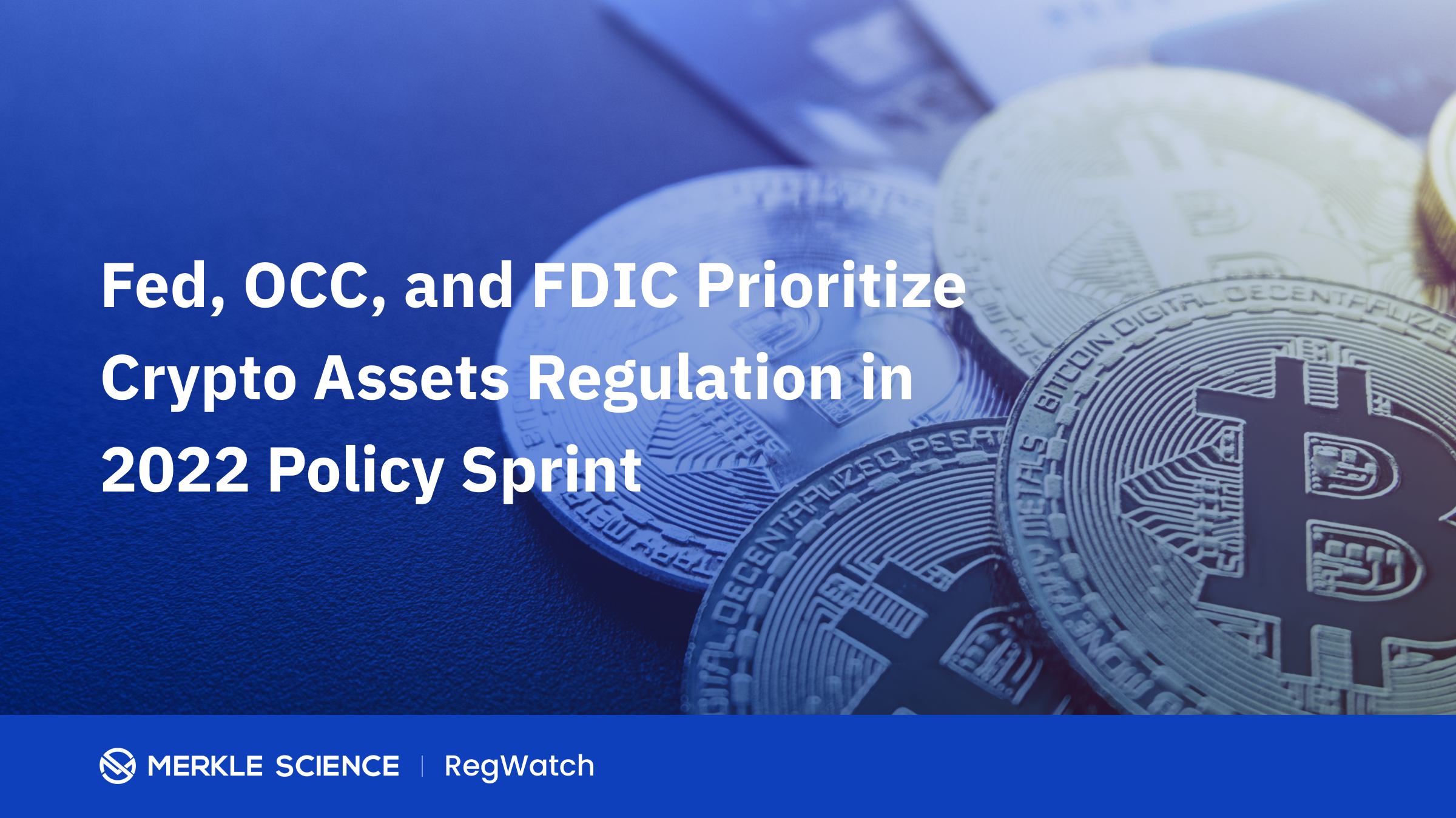The Federal Bank Regulatory Agencies Issue a Joint Statement Summarizing Crypto-Asset Policy Sprint

Merkle Science

On Nov 23, 2021, the Board of Governors of the Federal Reserve System, Federal Deposit Insurance Corporation (FDIC), and Office of the Comptroller of the Currency (OCC) — collectively referred to as the ‘agencies’ — issued a joint statement summarizing their interagency ‘policy sprints’ focused on crypto-assets.
Recognizing that supervised institutions are beginning to engage in crypto-asset-related activities, the agencies seek to provide coordinated and timely clarity on the regulation of crypto-assets. As per the official press release, the joint statement summarizes the agencies’ plan to promote safety and soundness in the crypto sphere, ensure consumer protection, and enforce compliance with applicable regulations, including anti-money laundering and illicit finance statutes.
To address crypto industry’s long standing desire for regulatory clarity, of late, the U.S. regulators have been ramping up crypto regulation efforts. Recently, the President’s Working Group on Financial Market (PWG) along with FDIC and OCC released a highly anticipated report on stablecoins. The stablecoin report focuses on analyzing risks posed by stablecoins used as means of payments and provides recommendations for overcoming these risks and addressing regulatory gaps. Further, earlier in September, the Department of Treasury’s Office of Foreign Assets Control (OFAC) issued the Updated Advisory on potential sanctions risks for facilitating ransomware payments in efforts to counter ransomware.
This week’s joint statement provides a roadmap of the steps that the Federal bank regulatory agencies will take for the regulation of crypto-assets. This roadmap will be rolled out in 2022. Further, the agencies also plan to evaluate the application of bank capital and liquidity standards to crypto-assets for activities involving U.S. banking organizations. To that end, the agencies will continue consulting with the Basel Committee on Banking Supervision. The Basel Committee on Banking Supervision (BCBS) is the primary global standard-setter for the prudential regulation of banks and provides a forum for regular cooperation on banking supervisory matters.
What did the sprint focus on?
Similar to technical sprints, the agencies leveraged their subject matter expertise, combined their knowledge and understanding of banking organizations’ potential involvement in crypto-asset-related activities, and conducted a preliminary analysis on various issues regarding crypto-assets.
The agencies focused on developing a commonly understood vocabulary using consistent terms regarding the use of crypto-assets by banking organizations. Secondly, the agencies identified and assessed key risks, including those related to safety and soundness, consumer protection, and compliance.
Thirdly, the agencies also considered legal permissibility related to potential crypto-asset activities conducted by banking organizations. During the crypto-asset sprint, the agency reviewed and analyzed a number of crypto-asset activities in which banking organizations may be interested in engaging including crypto-asset custody, facilitation of customer purchases and sales of crypto-assets, loans collateralized by crypto-assets, and activities involving payments and those that may result in the holding of crypto-assets on a banking organization’s balance sheet.
Lastly, the agencies analyzed the applicability of existing regulations and guidance, in addition to identifying areas that may benefit from additional clarification.
Crypto oversight road map
Based on this preliminary and foundational staff-level work, the agencies have identified a number of areas where additional public clarity is warranted. As a result, the agencies have developed a crypto-asset roadmap throughout 2022 that will provide clarity on the following topics :
- Crypto-asset safekeeping and traditional custody services
- Ancillary custody services
- Facilitation of customer purchases and sales of crypto-assets
- Loans collateralized by crypto-assets
- Issuance and distribution of stablecoins
- Activities involving the holding of crypto-assets on the balance sheet
To keep up with the rapidly evolving crypto sphere, the agencies will continue to monitor developments in crypto-assets and may address other issues as the market evolves. Further, the agencies will continue to engage and collaborate with other relevant authorities, as appropriate, on issues arising from activities involving crypto-assets.
How Merkle Science can help
With crypto regulations picking up speed in the U.S., crypto businesses should proactively put a compliance framework in place to mitigate regulatory risks — giving them a clear competitive advantage. Merkle Science provides a predictive crypto risk and intelligence platform, setting the standard for the next generation crypto threat detection, risk management, and compliance solutions. We are creating the infrastructure necessary so that a full range of entities including crypto businesses, insurers, and banks may transact safely with crypto.
Merkle Science’s highly customizable platform and proprietary Behavioral Rule Engine is easy-to-use, allowing institutions to detect illicit activity beyond the blacklists so that FIs may catch undetected suspicious activity that legacy providers might miss and better meet AML and KYC obligations as per guidance from jurisdictions around the world.
To find out how Merkle Science works for your business, please contact us via our website.


